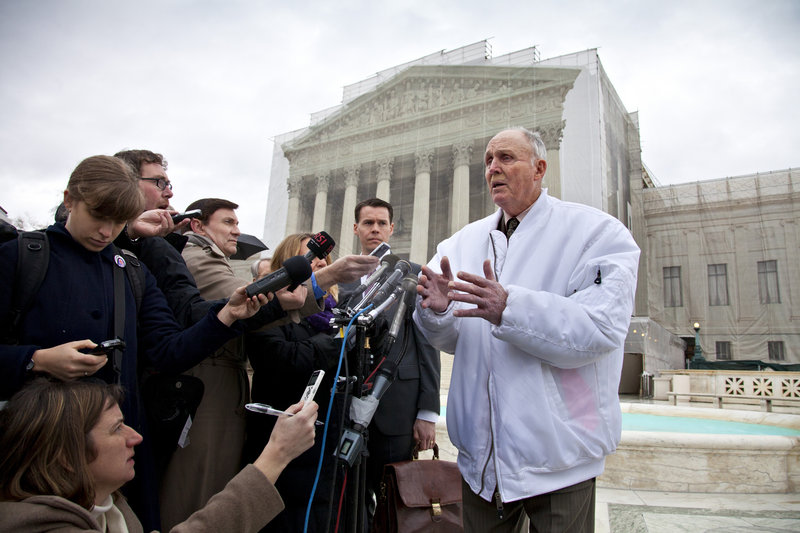Representatives from Maine’s organic farming industry say the public should be concerned after a ruling Monday by the U.S. Supreme Court that found an Indiana farmer violated Monsanto Co.’s patent on soybean seeds.
The court’s ruling is relevant because several Maine-based organizations, including the Organic Seed Growers and Trade Association and the Maine Organic Farmers and Gardeners Association, are plaintiffs in a related but separate court action pending against Monsanto.
“These cases have some similarities in that they challenge the overreach by these huge corporations,” said Jim Gerritsen, president of the Organic Seed Growers and Trade Association. “I think all Maine farmers and its citizens should be concerned.”
Gerritsen operates Wood Prairie Farm in the Aroostook County community of Bridgewater.
The justices unanimously rejected the argument of the Indiana farmer, Vernon Hugh Bowman, that cheap soybeans he bought from a grain elevator are not covered by the Monsanto patents, even though most of them also were genetically modified to resist the company’s Roundup herbicide.
The justices said Bowman should have bought new seed from Monsanto instead of going to a local grain elevator and purchasing the less expensive seeds typically used as feed and milling for a risky, late season soybean crop. Bowman did buy Monsanto’s more expensive “Roundup Ready” seeds for his main crop.
Monsanto, in order to protect its investment, has a policy that prohibits farmers from saving or reusing seeds once a crop is grown. Farmers must buy new seeds every year.
“The court’s ruling today ensures that longstanding principles of patent law apply to breakthrough 21st century technologies that are central to meeting the growing demands of our planet and its people,” David F. Snively, a Monsanto lawyer, said Monday in a statement posted on the company’s website.
“The ruling also provides assurance to all inventors throughout the public and private sectors that they can and should continue to invest in innovation that feeds people, improves lives, creates jobs and allows America to keep its competitive edge,” Snively said.
Heather Spaulding is interim director of the Maine Organic Farmers and Gardeners Association, an organization based in Unity. MOFGA is named as a plaintiff in the March 2011 suit against Monsanto.
“We are always disappointed when the biotech industry strikes out against any farmer that is trying to save seeds,” Spaulding said. “It is really difficult for us to understand how the biotech industry can justify laying claims to life forms through patents.”
Spaulding said her organization’s members are not only concerned about genetically engineered crops, but are also worried about Monsanto coming after them for patent infringements.
A legislative hearing on L.D. 718, An Act to Protect Food Consumers’ Right to Know about Genetically Engineered Food and Seed Stock, will be held Tuesday afternoon in Augusta.
MOFGA and the Organic Seed Growers and Trade Association, which is based in the town of Washington, filed suit against Monsanto in March 2011 in what Gerritsen describes as a pre-emptive strike to protect organic farmers from being accused of patent infringement by Monsanto.
A total of 83 plaintiffs from Maine and across the country are parties to the suit. The group is being represented in court by the Public Patent Foundation of Washington, D.C.
Gerritsen said farmers like himself could be sued if his organic crops were ever to become contaminated by Monsanto’s genetically modified seed.
Contamination could in theory occur if those genetically modified seeds or pollen, carried by winds, ever drifted into a neighboring organic farm field.
But rather than provide the plaintiffs with a binding promise that they would never sue them for patent infringement, Monsanto filed a motion to dismiss their complaint, said Dan Ravicher, executive director of the Public Patent Foundation.
And in February 2012, U.S. District Judge Naomi Buchwald of the Southern District Court of New York dismissed their complaint.
Ravicher, who is an attorney, appealed Buchwald’s decision. The appeal is currently pending in the U.S. Court of Appeals for the Federal Circuit. A hearing was held in January.
Gerritsen, who is an organic potato farmer, claims that since 1997, Monsanto has sued or settled in court with more than 844 family farms over alleged infringement after their seeds spread to nearby farms.
“Monsanto is the world’s most famous patent bully,” Gerritsen said. “Monsanto villainizes everyone they sue, and everyone they come up against becomes the bad guy.”
Gerritsen said the possibility of being sued for patent infringement poses a threat to the organic farming industry.
Tom Helscher, a Monsanto spokesman, could not be reached Monday night.
Dennis Hoey can be contacted at 791-6365 or at:
dhoey@pressherald.com
Send questions/comments to the editors.




Success. Please wait for the page to reload. If the page does not reload within 5 seconds, please refresh the page.
Enter your email and password to access comments.
Hi, to comment on stories you must . This profile is in addition to your subscription and website login.
Already have a commenting profile? .
Invalid username/password.
Please check your email to confirm and complete your registration.
Only subscribers are eligible to post comments. Please subscribe or login first for digital access. Here’s why.
Use the form below to reset your password. When you've submitted your account email, we will send an email with a reset code.